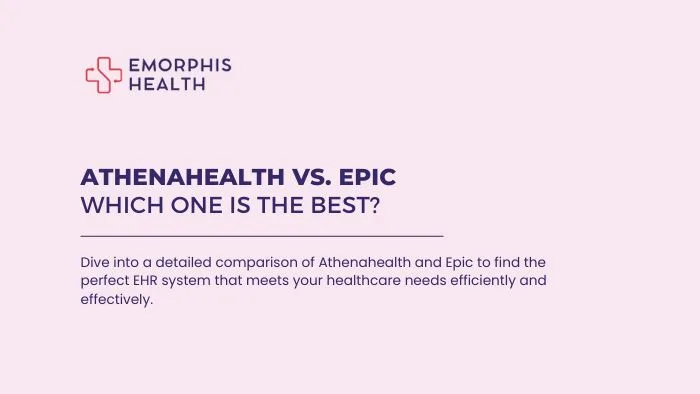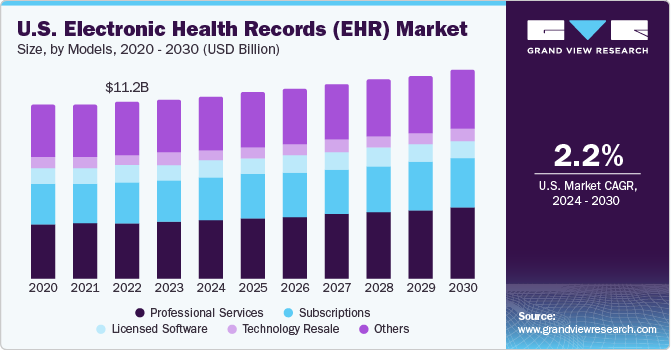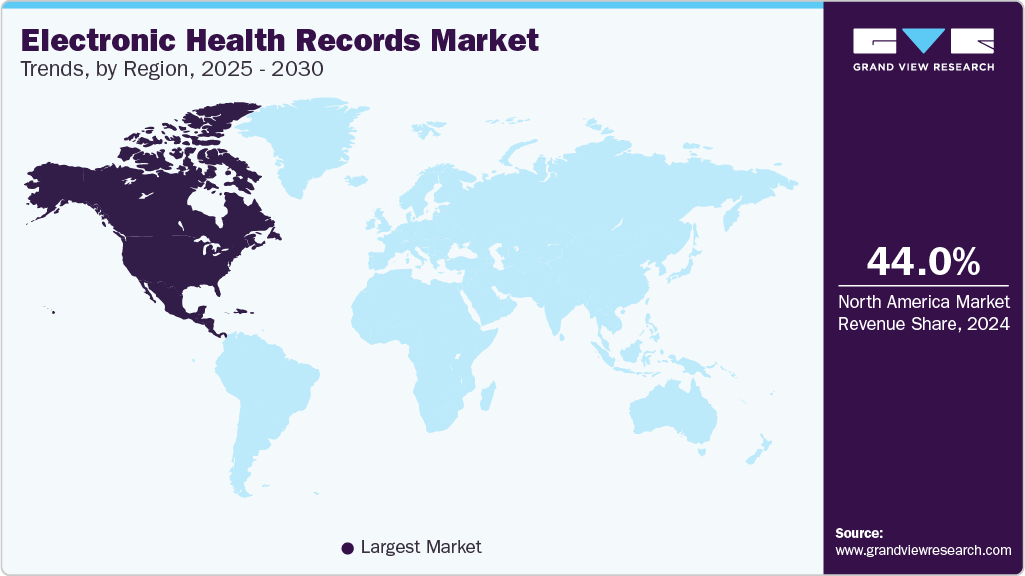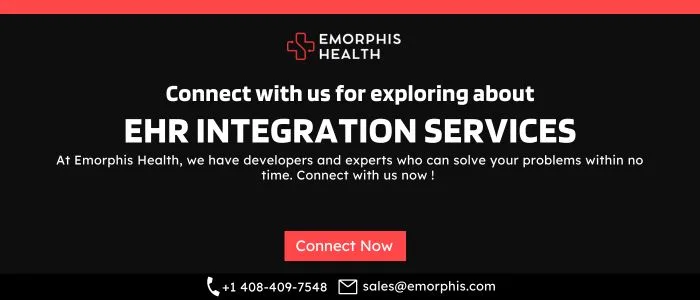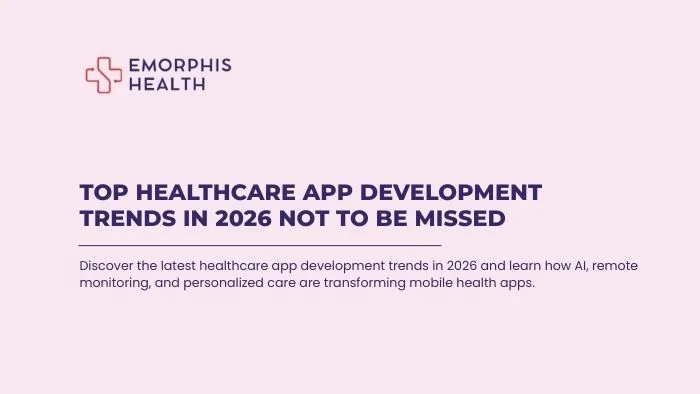Overview
See Contents
- 1 Overview
- 2 U.S. Electronic Health Record Market
- 3 athenahealth vs Epic – A Comparative Analysis in the EHR Market
- 4 User Experience – Navigating Through athenahealth and Epic Interfaces
- 5 Feature Comparison – What Do Athenahealth and Epic Bring to the Table?
- 6 Integration Capabilities – athenahealth vs Epic – Seamless Data Exchange and Interoperability
- 7 Cost Analysis – athenahealth vs Epic – Evaluating the Financial Implications
- 8 Scalability – athenahealth vs Epic – Which Platform Grows with Your Practice?
- 9 Customer Support – athenahealth vs Epic – Who Provides Better Assistance and Training?
- 10 Security Measures – athenahealth vs Epic – Protecting Patient Data with athenahealth and Epic
- 11 Case Studies – athenahealth vs Epic – Real-World Applications and Success Stories
- 12 AthenaHealth vs. Epic – A Comparative Analysis
- 13 Final Verdict – Determining the Best EHR for Your Healthcare Needs
Choosing the right Electronic Health Record (EHR) system is pivotal for healthcare providers aiming to enhance patient care, streamline administrative processes, and maintain data accuracy. Among the leading EHR contenders are Athenahealth and Epic, both of which offer robust, albeit distinct, solutions. In this article we will explore a comprehensive comparison of these two giants – athenahealth vs Epic, examining their features, user experiences, integration capabilities, cost structures, and more, to help you determine which system is best suited for your healthcare practice.
The healthcare industry is rapidly evolving, and choosing an EHR system can significantly impact a healthcare provider’s efficiency and effectiveness. Let’s look at some of the comparative market share data as per 6sense reports.
athenahealth vs Epic – A Comparative Analysis in the EHR Market
athenahealth
- Provides network-enabled services and mobile apps for medical groups and health systems.
- Current Customers: 6,721
- Market Share: 22.43%
- Ranking: #1 in the Electronic Health Records (EHR) market.
Epic Software
- Supplies healthcare software used by U.S. hospitals and health systems for managing electronic medical records.
- Current Customers: 2,292
- Market Share: 7.65%
- Ranking: #4 in the Electronic Health Records (EHR) market.
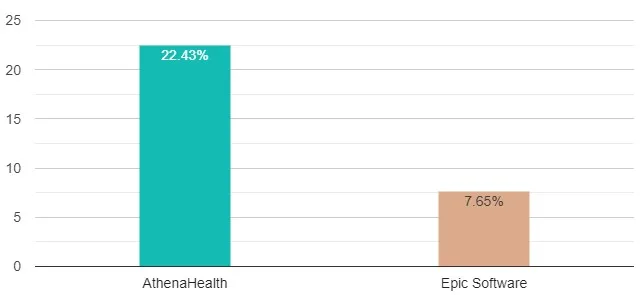
Market Presence
AthenaHealth boasts a significant market presence with 22.43% of the EHR market share, positioning it as the market leader. In contrast, Epic Software holds a 7.65% market share, ranking fourth. AthenaHealth has a larger customer base, serving 6,721 clients compared to Epic’s 2,292.
Geographic Distribution
AthenaHealth: Predominantly serves customers in the United States, India, and Canada.
Epic Software: Primarily serves customers in the United States, Canada, and the United Kingdom.
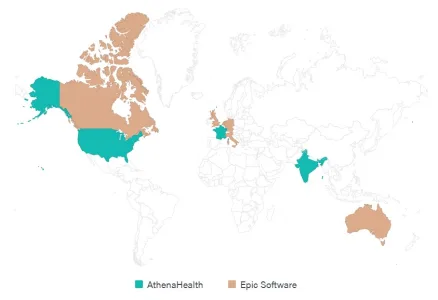
Competitive Landscape
athenahealth and Epic Software compete in several markets:
- Electronic Health Records (EHR)
- Medical Billing
- Medical Practice Management
- Patient Portal and Communication
AthenaHealth leads the EHR market with a more extensive customer base and higher market share, while Epic Software maintains a strong presence with its specialized healthcare solutions. Both companies are pivotal players, driving innovation and efficiency in the healthcare industry.
Epic is renowned for its extensive, large-scale deployments in major hospitals and health systems, while Athenahealth is celebrated for its cloud-based, user-friendly platform that appeals to smaller practices and outpatient settings.
Further, lets look at in detail. We will try to explore various aspects of both systems to help you make an informed decision.
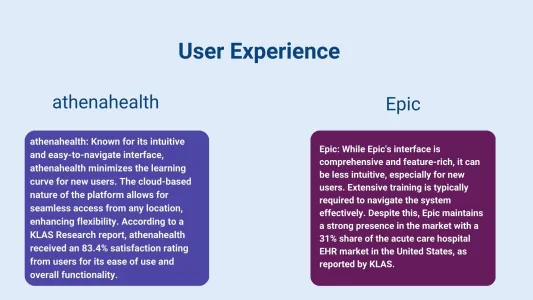

Athenahealth: Known for its intuitive and easy-to-navigate interface, athenahealth minimizes the learning curve for new users. The cloud-based nature of the platform allows for seamless access from any location, enhancing flexibility. According to a KLAS Research report, athenahealth received an 83.4% satisfaction rating from users for its ease of use and overall functionality.
Epic: While Epic’s interface is comprehensive and feature-rich, it can be less intuitive, especially for new users. Extensive training is typically required to navigate the system effectively. Despite this, Epic maintains a strong presence in the market with a 31% share of the acute care hospital EHR market in the United States, as reported by KLAS.
Feature Comparison – What Do Athenahealth and Epic Bring to the Table?
Athenahealth
- Cloud-Based Platform:
- Real-Time Access: Athenahealth’s cloud-based architecture allows healthcare providers to access patient records and system features from any location, at any time.
- Automatic Updates: Ensures the system is always up to date with the latest features and regulatory requirements without manual intervention.
- Interoperability:
- Open API: Facilitates seamless integration with various third-party applications, devices, and other healthcare systems.
- Health Information Exchange: Promotes effective data sharing and coordination among different healthcare providers.
- Patient Engagement:
- Patient Portal: Offers an intuitive portal for patients to access their health records, schedule appointments, and communicate with their healthcare providers.
- Telehealth Services: Provides robust telehealth capabilities to support virtual visits and remote patient monitoring.
- Revenue Cycle Management:
- Automated Billing: Streamlines the billing process with automated coding and claims submission, reducing administrative burden.
- Financial Analytics: Delivers detailed financial reports and insights to help practices manage revenue and improve financial performance.
- Population Health Management:
- Data Analytics: Utilizes advanced analytics to identify at-risk populations and manage chronic conditions effectively.
- Care Coordination: Supports coordinated care efforts with tools to track and manage patient outcomes across different care settings.
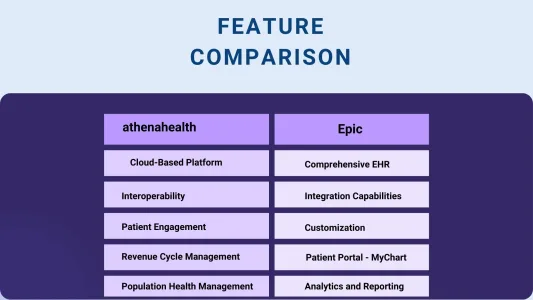

Epic
- Comprehensive EHR:
- Inpatient and Outpatient Care: Provides extensive features for managing both inpatient and outpatient care, including specialty-specific modules.
- Clinical Documentation: Offers robust tools for clinical documentation, order entry, and decision support.
- Integration Capabilities:
- Care Everywhere: Facilitates secure data sharing and integration with other EHR systems, promoting interoperability across healthcare networks.
- Device Connectivity: Integrates seamlessly with a wide range of medical devices and health IT systems.
- Customization:
- Modular Approach: Allows healthcare organizations to customize the system to meet their specific needs, adding or modifying features as required.
- User Configurations: Provides extensive options for customizing workflows, templates, and user interfaces.
- Patient Portal – MyChart:
- Comprehensive Access: MyChart enables patients to access their medical records, communicate with providers, schedule appointments, and manage medications.
- Patient Engagement Tools: Includes features like appointment reminders, health education resources, and online bill payment.
- Analytics and Reporting:
- Real-Time Analytics: Offers powerful analytics tools for real-time data analysis, helping providers make informed clinical and operational decisions.
- Quality Reporting: Supports regulatory reporting requirements and quality improvement initiatives with detailed data analytics and reporting capabilities.
Integration Capabilities – athenahealth vs Epic – Seamless Data Exchange and Interoperability
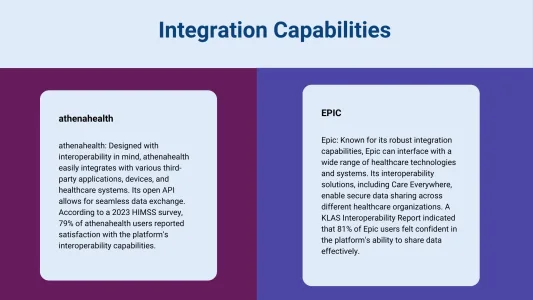

Athenahealth: Designed with interoperability in mind, athenahealth easily integrates with various third-party applications, devices, and healthcare systems. Its open API allows for seamless data exchange. According to a 2023 HIMSS survey, 79% of athenahealth users reported satisfaction with the platform’s interoperability capabilities.
Epic: Known for its robust integration capabilities, Epic can interface with a wide range of healthcare technologies and systems. Its interoperability solutions, including Care Everywhere, enable secure data sharing across different healthcare organizations. A KLAS Interoperability Report indicated that 81% of Epic users felt confident in the platform’s ability to share data effectively.
Cost Analysis – athenahealth vs Epic – Evaluating the Financial Implications
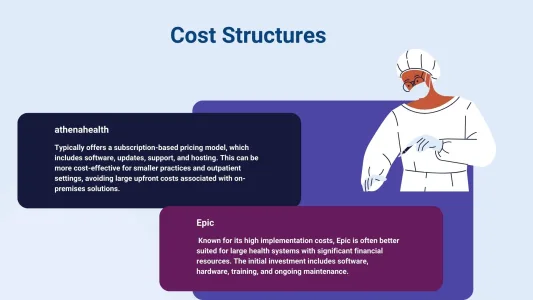

Athenahealth: Typically offers a subscription-based pricing model, which includes software, updates, support, and hosting. This can be more cost-effective for smaller practices and outpatient settings, avoiding large upfront costs associated with on-premises solutions. According to athenahealth, their clients see an average 6% increase in collections and a 32% reduction in days in accounts receivable.
Epic: Known for its high implementation costs, Epic is often better suited for large health systems with significant financial resources. The initial investment includes software, hardware, training, and ongoing maintenance. However, a 2019 Arch Collaborative report found that large hospitals using Epic experienced a 7.8% improvement in clinical efficiency.
Scalability – athenahealth vs Epic – Which Platform Grows with Your Practice?
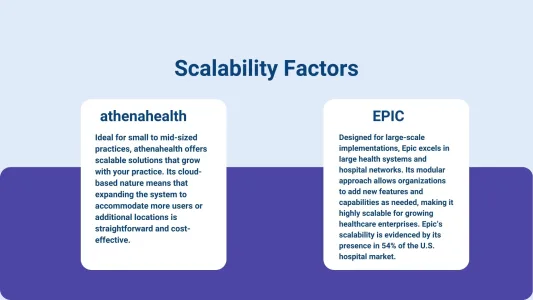

Athenahealth: Ideal for small to mid-sized practices, athenahealth offers scalable solutions that grow with your practice. Its cloud-based nature means that expanding the system to accommodate more users or additional locations is straightforward and cost-effective.
Epic: Designed for large-scale implementations, Epic excels in large health systems and hospital networks. Its modular approach allows organizations to add new features and capabilities as needed, making it highly scalable for growing healthcare enterprises. Epic’s scalability is evidenced by its presence in 54% of the U.S. hospital market.
Customer Support – athenahealth vs Epic – Who Provides Better Assistance and Training?
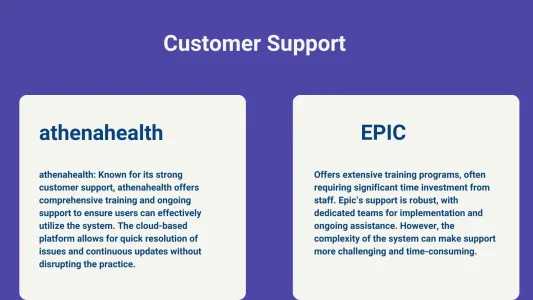

Athenahealth: Known for its strong customer support, athenahealth offers comprehensive training and ongoing support to ensure users can effectively utilize the system. The cloud-based platform allows for quick resolution of issues and continuous updates without disrupting the practice. In a Black Book survey, athenahealth received a 91% satisfaction rate for customer support.
Epic: Offers extensive training programs, often requiring significant time investment from staff. Epic’s support is robust, with dedicated teams for implementation and ongoing assistance. However, the complexity of the system can make support more challenging and time-consuming. Despite this, a 2020 KLAS report indicated that 74% of Epic users were satisfied with the support provided.
Security Measures – athenahealth vs Epic – Protecting Patient Data with athenahealth and Epic
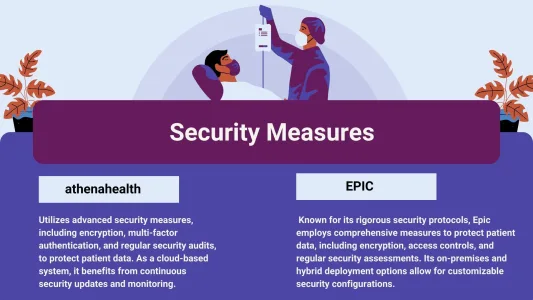

Athenahealth: Utilizes advanced security measures, including encryption, multi-factor authentication, and regular security audits, to protect patient data. As a cloud-based system, it benefits from continuous security updates and monitoring. athenahealth’s platform complies with HIPAA and other relevant regulations, ensuring high standards of data protection.
Epic: Known for its rigorous security protocols, Epic employs comprehensive measures to protect patient data, including encryption, access controls, and regular security assessments. Its on-premises and hybrid deployment options allow for customizable security configurations. Epic’s strong security practices have earned it high marks in multiple industry assessments.
Case Studies – athenahealth vs Epic – Real-World Applications and Success Stories
Athenahealth: Small to mid-sized practices have reported significant improvements in efficiency and patient care with athenahealth. For example, the University of Toledo Physicians reported a 10% increase in patient satisfaction and a 20% reduction in administrative workload after implementing athenahealth.
Epic: Large health systems and hospitals often showcase Epic’s ability to handle complex healthcare environments. For instance, Kaiser Permanente, one of the largest healthcare providers in the U.S., uses Epic to manage patient records across its vast network, contributing to a 15% reduction in readmission rates.
For a more brief view here is the comparative analysis of athenahealth vs Epic in a table format.
AthenaHealth vs. Epic – A Comparative Analysis
| Feature | AthenaHealth | Epic |
|---|---|---|
| Target Audience | Small to mid-sized practices | Large health systems |
| Market Share | 22.43% | 7.65% |
| Current Customers | 6,721 | 2,292 |
| Geographic Presence | United States, India, Canada | United States, Canada, United Kingdom |
| Platform | Cloud-based | On-premise and cloud-based |
| User Interface | Intuitive and user-friendly | Comprehensive and feature-rich |
| Integration Capabilities | Flexible, easy integration with various third-party apps | Robust, extensive integration with a wide range of systems |
| Scalability | Ideal for small to mid-sized practices | Highly scalable, suitable for large health systems |
| Data Security | HIPAA compliant, regular updates and security patches | Advanced security measures, HIPAA compliant |
| Patient Engagement | Patient portals, mobile apps, communication tools | MyChart patient portal, extensive patient engagement features |
| Revenue Cycle Management | Integrated medical billing and claims management | Comprehensive revenue cycle management tools |
| Interoperability | Supports interoperability with other EHR systems | High interoperability, widely adopted in the U.S. |
| Customer Support | 24/7 customer support, training resources | Dedicated support teams, extensive training and resources |
| Customization | Limited customization options | Highly customizable to meet specific organizational needs |
| Implementation Time | Relatively quick implementation | Longer implementation time due to extensive customization |
| Cost | Cost-effective | Requires significant investment |
| Ranking in EHR Market | #1 | #4 |
| Common Markets | EHR, Medical Billing, Medical Practice Management, Patient Portal and Communication | EHR, Medical Billing, Medical Practice Management, Patient Portal and Communication |
Final Verdict – Determining the Best EHR for Your Healthcare Needs
The choice between AthenaHealth vs Epic ultimately depends on the specific needs and circumstances of your healthcare organization. When comparing AthenaHealth vs Epic, it’s clear that AthenaHealth is an excellent choice for small to mid-sized practices seeking a user-friendly, cost-effective, and flexible cloud-based solution. On the other hand, in the AthenaHealth vs Epic debate, Epic stands out with its extensive feature set, robust integration capabilities, and scalability, making it better suited for large health systems with the resources to invest in a comprehensive and customizable EHR platform. Thus, in the AthenaHealth vs Epic comparison, each platform offers unique advantages tailored to different organizational needs. Choosing between AthenaHealth vs Epic requires careful consideration of your practice’s size, budget, and specific EHR requirements.
For more details on AthenaHealth vs Epic or any other comparison connect with us. Moreover for EHR integration and to explore how your healthcare organization can benefit from advanced solutions, connect with Emorphis Health. Our team of experts specializes in seamless EHR integration, ensuring that your systems are efficient, interoperable, and tailored to your unique needs. Whether you’re looking to enhance patient care, streamline workflows, or improve data management, Emorphis Health offers the expertise and support you need.
Contact us today to learn more about our comprehensive EHR integration services and how we can help your organization achieve its healthcare technology goals.
Before you go, watch a brief video of the comparison.

